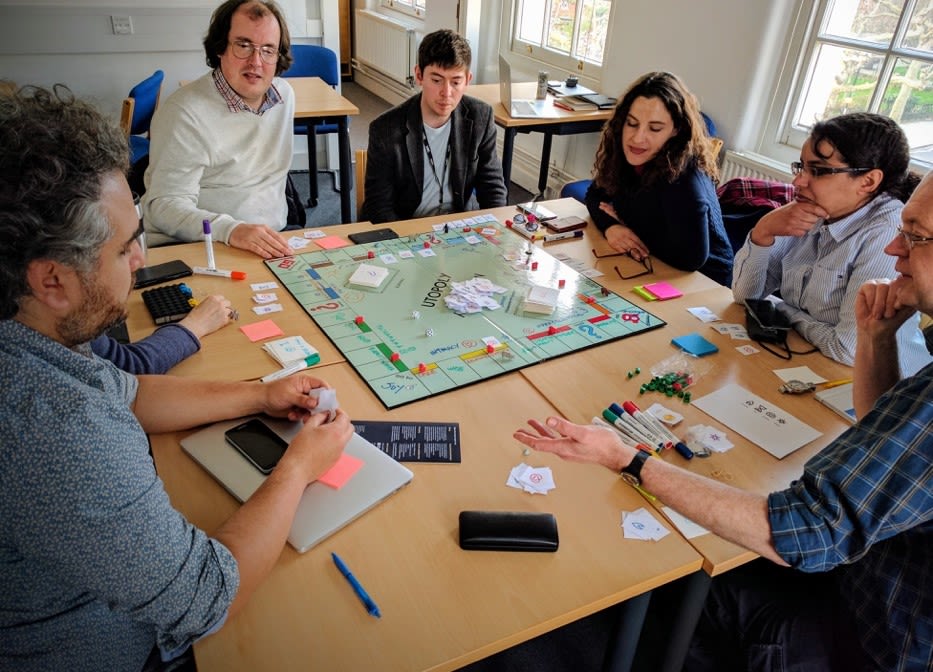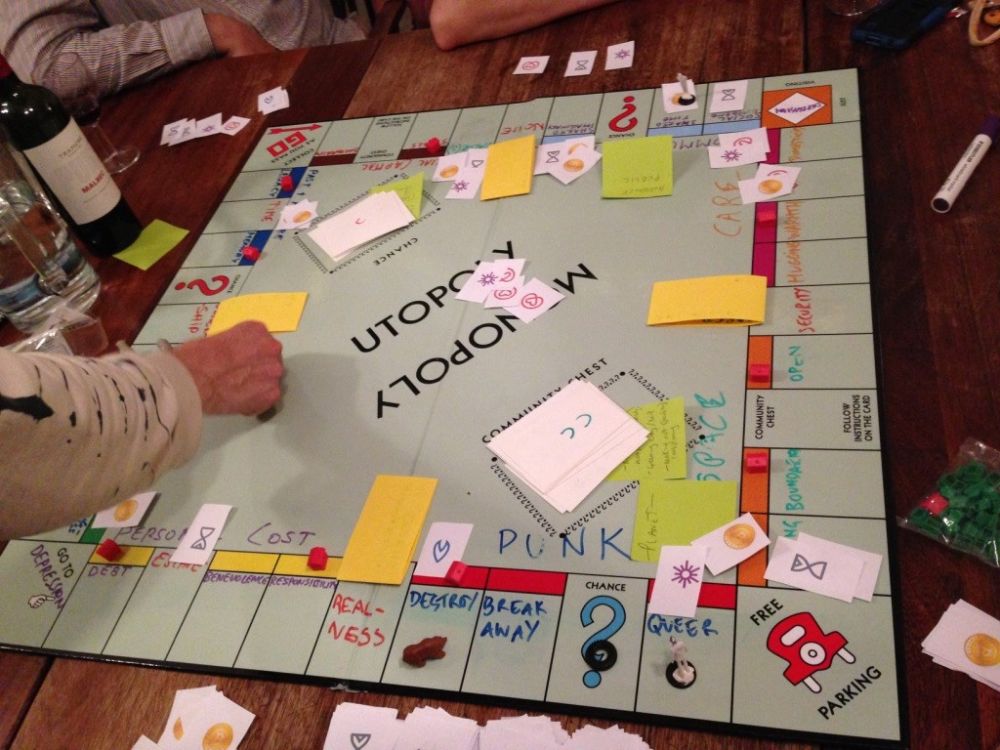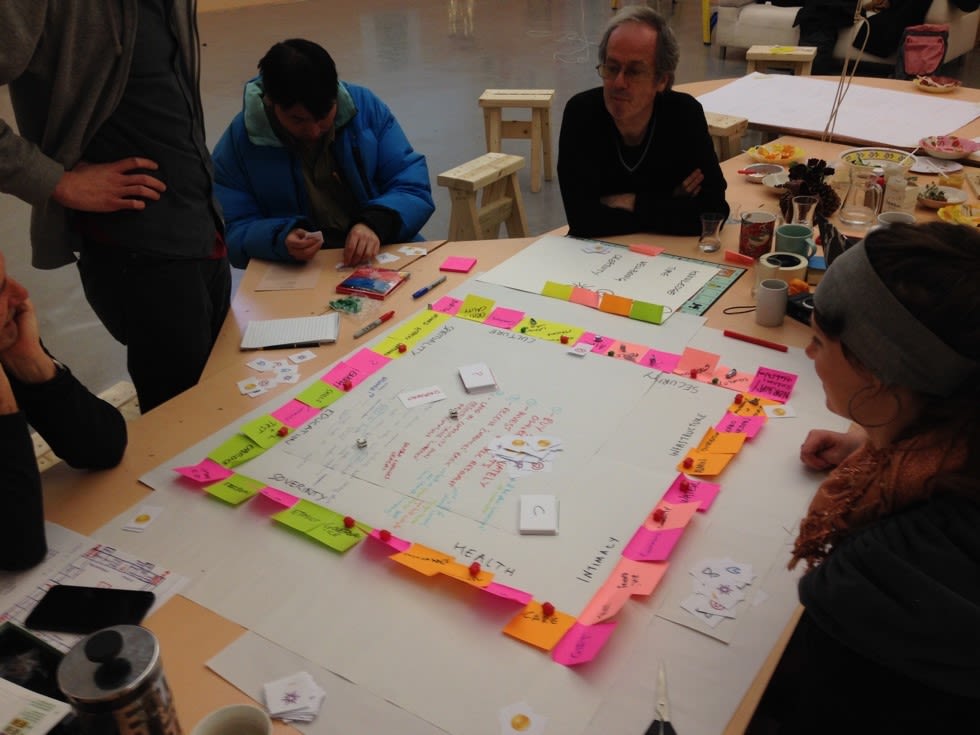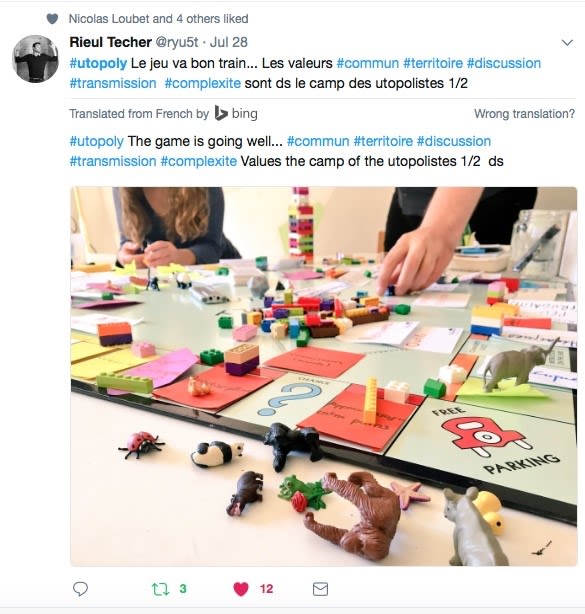Article by Neil Farnan, PhD Student, Chelsea College of Arts.
Join us in using play to design a utopian economy. We are inviting participants to engage in the next round of games to develop the Utopoly research method.
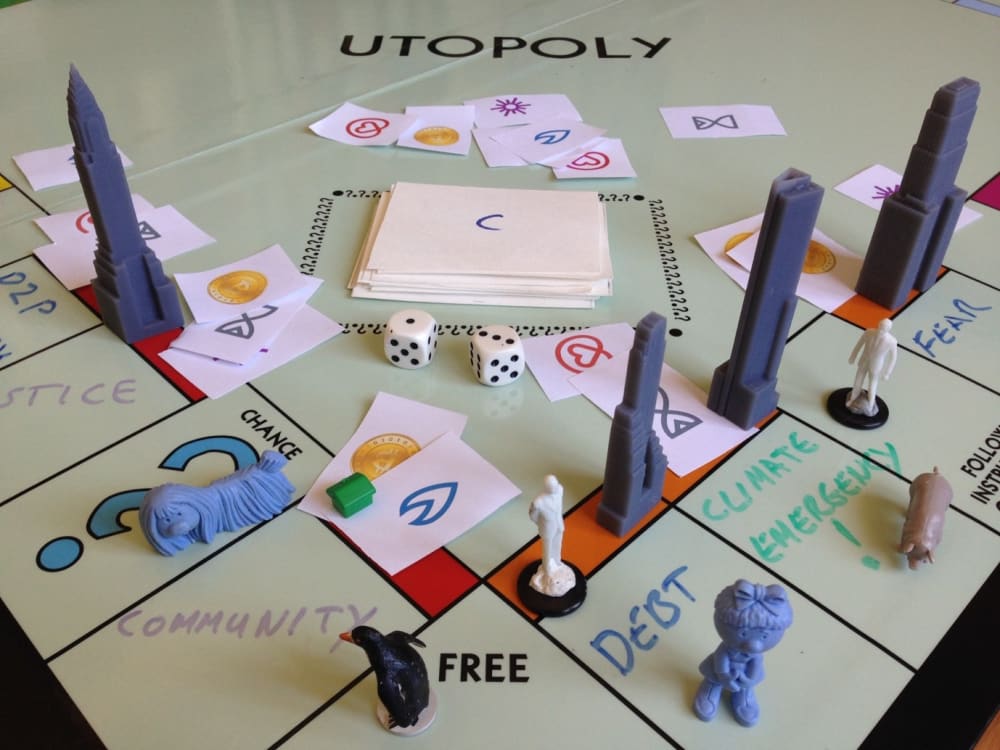
Utopoly is a tool for inquiry, reflection and idea generation. It uses a game as utopian practice to critique the state of society and engage in speculation about how to shape the future. Through improvisational play Utopoly provides that rare space for people to re-imagine society, where values, forms of exchange and social relations can be reconsidered and reconfigured. Players then negotiate, interact with, and evaluate the alternative social and political spaces that emerge. In addition, by providing a platform for beneficial expectations it cultivates the ‘education of desire’ for a better world.
This project was founded on the idea of using utopian art to challenge neoliberalism at its core, that of finance and economics. The Utopoly method draws parallels with Foucault’s notion of ‘Parrhesia’ or ‘truth telling’, to engage critically with the now or ‘what has become’ in order to open up space for the future or ‘what is yet to become’. Additionally, play provides an important function as Kuntz & Guyotte (2018, p.665) state “Through play, the work of inquiry manifests alternative possibilities, with particular ramifications for social justice engagements in education. Perhaps more provocatively stated: through play, inquiry becomes critical; absent play, inquiry all-too-easily becomes a normalizing process, reinforcing the dominant status quo.”
Utopoly board game images
The Utopoly method evolved from collaborative practice-based action research carried out by Critical Practice the research cluster based at Chelsea. We were concurrently working on the even #TransActing: A Market of Values (Critical Practice, 2017) (based around values that had no cash equivalent) and ideas for a ‘hack’ of the board game Monopoly. A game that now celebrates and normalises competitive accumulation and socially useless rentier behaviour. But which had a much more progressive origin. Its inventor Elizabeth Magie in 1904 intended a pedagogical function, showing how landlords accumulate wealth and impoverish society. She also included strategies for countering these effects.
The initial part of Utopoly involves a Future Workshop as designed by Robert Jungk (Jungk and Müllert,1987) in the 1960s. It was a method to engage citizens in public decision making and planning. Jungk believed that all people had the potential for genius and wanted to tap into the neglected resource of their imagination. There are three phases: critiquing a current situation, imagining a fantasy or idealised future, then implementing that future. In Utopoly the implementation is carried out in the game and playing board. Players then experience and reflect on the new economic and social possibilities they have created. In this way Utopoly reveals and illuminates features of the present and possibilities for the future. Productive adult play is often a denigrated, undervalued and under-utilized activity. The utopian aspect of games provides the opportunity to generate visions of the future as indicated by Flanagan (2010, p.50) describing games as “systems for imagining what is possible” and as “reality engines”. This is the process that is played out in Utopoly.
Over several games the Utopoly research method has evolved and we invite you to take part in its evolution.
For instance, during a session at 'What Happens to Us' at Wimbledon College of Art (ArtRabbit, 2016) the currencies that emerged from #TransActing: A Market of Values were incorporated into the game. These changed the nature of the transactions normally associated with Monopoly. They provided an ecosystem of value exchange and exposed a new appreciation of the diverse contributions made by society at large. Players engaged with the notion of the commons and how a new social contract could come to be considered.
Interest in Utopoly has spread internationally with research colleagues playing in France running a Utopoly Camp à la MYNE and an article published on the New School Public Seminar (New York), Utopoly – A utopian design game.
As a result, there has been a request for procedural instructions on how to play. This requires careful consideration as procedures can have an effect of closing down creativity and tending towards formulaic responses. Other activist and pedagogical games often have pre-designed formats for players to inhabit and Utopoly’s improvisational nature is what makes it different. So, in order to keep with the spirit of the method, looser open guidelines would seem more appropriate.
An outcome of this research is therefore to develop these guidelines and to then share them and the board as freely available creative commons versions.
We have two sessions due to run at Chelsea College room E305:
- Saturday 22 June 2019, 12.30pm to 5.30pm
- Saturday 20 July 2019, 12.30pm to 5.30pm
With further sessions planned.
To sign up to a session or express interest in future participation please send an email to: n.farnan0720161@arts.ac.uk
References:
- ArtRabbit (2016) What Happens to Us (Accessed: 26 September 2017).
- Critical Practice (2017) Critical Practice #TransActing: A Market of Values (Accessed: 24 September 2017).
- Flanagan, M. (2010) 'Creating Critical Play, in Catlow, R. et al. (eds.) Artists Re:Thinking Games. Place of publication: Liverpool University Press, pp. 49-53.
- Guyotte, K. and Kuntz, A. (2018) ‘Inquiry on the Sly: Playful Intervention as Philosophical Action', Qualitative Inquiry, Volume 24(9) October 2018, 664–671.
- Jungk, R., Müllert, N. (1987) Future workshops: how to create desirable futures. Institute for Social Inventions, London.


